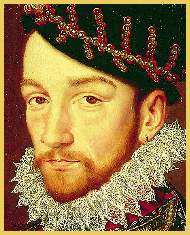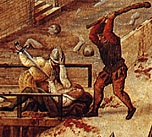
Charles IX (Saint-Germain-en-Laye, 1550 Vincennes, 1574), king from 1560 to 1574, wire of Henri II and Catherine de Médicis. This one exerted the effective power during all the reign, which the wars of religion and the favour of Coligny near the king (1570-1572) marked. At the instigation of his mother, Charles IX ordered the disastrous massacre of Saint-Barthélemy (1572).
Arrive the day of the Barthélemy Saint, August 24 1572, with the massacre of the Protestants. It is Catherine de Médicis, the mother of king de France, who is at the origin of carnage: It had invited all the Protestant heads in Paris for the marriage of her daughter.
Only in Paris, more than 3 000 men are killed in one day, and water of the Seine is reddened of their blood. Slaughter is spread quickly in all the province.

A contemporary, the Duke of Sully, estimates that some 70 000 men were killed during this period of disorder which lasted 6 weeks.
In XVIe century, France was the country more populated (16 million) and best unified Europe. In first half of the century, the capacity of king de France did not cease being strengthened thanks to a consolidation of the institutions (use of the French to the detriment of Latin, appointment of the Bishops by the king...) and with the fastening of several principalities or duchies. The wonders of the Rebirth reported of the wars of Italy by Charles VIII and François Ier added to the prestige of the court of France.
But the wars repeated against the countries close and the sumptuous way of life to the court were expensive the State, more especially as tensions between catholics and Protestants appeared. The prémarurée death of Henri II into 1559 was catastrophic for France of the second part of XVIe century. Deprived of powerful monarch, the country tore in a succession of appalling wars of religion which ended only with the end of the Valois dynasty (1589) and the proclamation of the Edict of Nantes in 1598.
Index of France in XVIe century